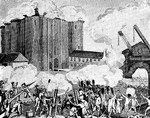Clipart tagged: ‘Bastile’

Bastile
"The taking of the Bastile, July 14, 1789. The Parisian mob, not satisfied with the formation of the…

"The taking of the Bastile, July 14, 1789. The Parisian mob, not satisfied with the formation of the…